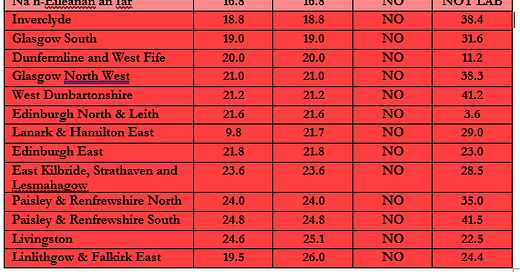Could Keir Starmer be the big winner from Nicola Sturgeon's departure?
Recovery in Scotland would make a Commons majority for Labour much easier
Nicola Sturgeon today announced her resignation as SNP leader, after over 8 years as first minister, and nearly 20 years as either leader or deputy leader of her party. Scotland’s First Minister has been a remarkably popular politician, maintaining positive approval ratings for most of her long incumbency, an achievement few in contemporary British politics can match. She will be a very tough act to follow.
Sturgeon’s departure may open a window of opportunity for Scottish Labour. After a series of mediocre and poorly rated leaders, the Scottish Labour party has already been enjoying a modest recovery under the well regarded Anas Sarwar, whose own strong approval ratings have matched Sturgeon in some polls. Yet the swing to Labour in Scottish polling lags well behind that recorded in polling in England and Wales. If Sarwar and Starmer are able to outshine Sturgeon’s successor, then a bigger Labour rebound may be on the cards. And Labour recovery in Scotland may have major implications for the party’s Westminster prospects.
Taking the average of the most recent Westminster polls from 6 pollsters1 (Survation, ComRes, Panelbase, YouGov, IPSOS-MORI and Redfield and Wilton), all of whom have published polls on Scottish Westminster voting preferences since late November, we get the following current polling situation (figures in brackets are change on the 2019 general election result):
SNP: 44.3 (-0.7)
Labour: 28.7 (+10.1)
Conservatives: 16.2 (-8.9)
SNP to Labour swing: 5.4 points
This looks like a substantial Conservative to Labour swing, with Scottish Labour in a clear second place, having been pushed to third by the Scottish Conservatives in their general 2019 slump. But there is little or no change evident in the SNP, on 44 points, down less than one per cent on their 2019 result. SNP resilience puts a low ceiling on possible Labour gains in Scotland, as even a double digit rise in Labour share nets out to just a 5 point swing from the SNP. A change in SNP leader may offer an opportunity for Scottish Labour to win over support directly from the nationalists, increasing the swing they achieve and putting more seats in play.
SNP seats vulnerable to Labour on the current swing (light red), 9 point swing (medium red) and 13 point swing (dark red)
The SNP to Labour swing in current polling, if replicated in the next general election, would gain Starmer’s opposition four seats, all of them marginal seats Labour also won back under Corbyn in 2017 before surrendering them back to the SNP two years later. If Scottish Labour were able to increase the SNP to Labour swing from five to nine points this could bring another nine seat gains, mostly in terrain where Scottish Labour was very strong prior to its 2015 collapse.2 If we increase the SNP to Labour swing to 13 points, which is still below the Conservative to Labour swing evident in current polling outside Scotland, another 13 seats fall from the SNP to Labour, including several where the party would come from third place to win.
Recovering support from the SNP would thus greatly boost Keir Starmer’s chances of securing a majority at the next election, potentially bringing in 20 seats or more which would not fall had the status quo under Sturgeon continued. A Scottish Labour rebound could also change the political equation if Labour fell short of a majority, as each Labour gain from the SNP makes it less likely that a Starmer minority government would have to rely on SNP support to govern. A Labour minority which could ignore the SNP and still govern would likely be more stable than one reliant on Scottish nationalist acquiescence if not active support.
A Scottish Labour rebound is by no means certain. Much of the SNP’s current support is rooted in support for Scottish independence - and while Nicola Sturgeon articulated and campaigned for the independence cause with great skill, attachments to this cause are unlikely to hinge on her leadership. On the other hand, recent polling suggests independence is not currently a top priority for most Scottish voters, with the NHS and the cost of living topping the agenda even among pro-independence voters and SNP supporters. Nicola Sturgeon’s departure has provided Scotish Labour with its best opportunity yet to recover from its post Independence Referendum collapse. Grasping this opportunity will open the door to a new Labour government at Westminster a little wider.
My thanks to David Cowling for providing these figures
The exception, and the least likely gain in this category is Na h-Eileanan an Iar (Western Isles) - Britain’s smallest constituency (21,000 voters) has deeper links to the SNP, having returned its first SNP MP in 1970. However, even here Labour was successful as recently as 2005.




